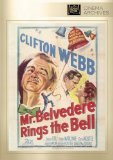| Reviews & Columns |
|
Reviews DVD TV on DVD Blu-ray 4K UHD International DVDs In Theaters Reviews by Studio Video Games Features Collector Series DVDs Easter Egg Database Interviews DVD Talk Radio Feature Articles Columns Anime Talk DVD Savant Horror DVDs The M.O.D. Squad Art House HD Talk Silent DVD
|
DVD Talk Forum |
|
|
| Resources |
|
DVD Price Search Customer Service #'s RCE Info Links |
|
Columns
|
|
|
Mr. Belvedere Rings the Bell (Fox Cinema Archives)
"I never ask anyone permission to do anything. They might say, "No," and they'd be embarrassed."
"Why?" "Because I'd do it anyway."
A complete and utter delight. 20th Century-Fox's own M.O.D. (manufactured on demand) service, the Fox Cinema Archives, which caters to movie lovers looking for those hard-to-find library and cult titles, has released Mr. Belvedere Rings the Bell, the 1951 comedy from Fox starring Clifton Webb in his third and last big-screen appearance as imperious, hedonistic, waspish...and kind-hearted author, Lynn Belvedere. Costarring Joanne Dru, Hugh Marlowe, and Zero Mostel, along with a collection of cutie-pie old codgers (Billy Lynn, Doro Merande, Frances Brandt, Kathleen Comegys, Jane Marbury, Harry Hines), Mr. Belvedere Rings the Bell expertly blends hilarity and a gentle sweetness into a memorable little comedy you won't soon forget―hands down, it's the funniest movie I've seen this year. No extras, however, for this razor-sharp black and white transfer.

Seated in a quiet city park, noted author and lecturer, Lynn Belvedere (Clifton Webb), currently engaged in a cross-country speaking tour on the subject of staying youthful and vibrant regardless of age, overhears several members of the Church of John Home for the Aged morosely lamenting their infirmities and depressing prospects. Determined to put his theories to work, 46-year-old Mr. Belvedere hatches a plot to pass himself off as recently-deceased 77-year-old Oliver Erwenter, and commit himself to the rest home, run by well-meaning-but-stuffed shirt Reverend Charles Watson (Hugh Marlowe). When Mr. Belvedere arrives, he astonishes everyone with his youthful vigor, his imperious, unafraid fortitude, and his unending line of outrageous bullsh*t. The inmates at the home―mousy Mr. Beebe (Billy Lynn), sour Mrs. Hammer (Doro Merande), drunken Miss Hoadley (Frances Brandt), prude Mrs. Gross (Jane Marbury), wistful Mrs. Sampler (Kathleen Comegys), and Mr. Beebe's sidekick, former stamp collector Mr. Cherry (Harry Hines)―are completely flabbergasted by this tornado of fresh air brought in by Mr. Belvedere, who claims he has the solution to their depressed, aging spirits: feel young and you will be young. Reverend Watson, stunted by his narrow ambition, the financial limitations of his poor parish, and his own timid nature, doesn't like pushy Mr. Belvedere coming in and getting everyone's hopes up, but nurse Harriet Tripp (Joanne Dru), Reverend Watson's stacked assistant, quickly understands how beneficial Mr. Belvedere has been to the rejuvenated oldsters...and to her, as well, in her pursuit of the reticent Reverend Watson.
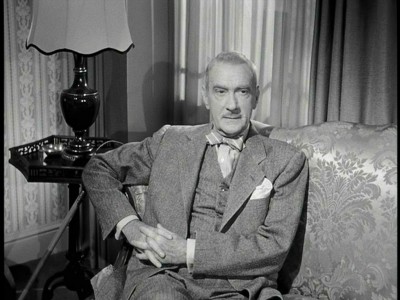
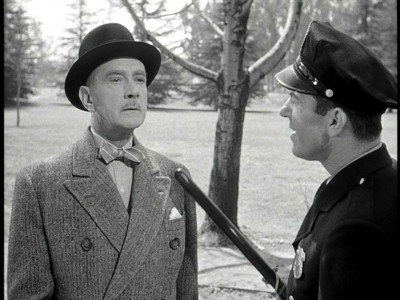
Mr. Belvedere Rings the Bell was the third and last in the big-screen adventures of author Gwen Davenport's beloved character, which first appeared in her 1947 novel, Belvedere. 20th Century-Fox snapped up the rights to the comedic best-seller and adapted it into a star vehicle for contract player and Broadway star Clifton Webb; the resulting Sitting Pretty was a smash hit in 1948 with audiences who immediately took to the haughty, commanding Webb playing an author playing at babysitter for a suburban family (a still of Webb overturning a bowl of oatmeal on a screaming baby became his most recognizable cinematic moment). Such was the acclaim for Webb's role (he even managed an Academy Award nomination for Best Actor―relatively rare back then for a comedic turn) that a sequel was quickly ordered; 1949's Mr. Belvedere Goes to College, while not as critically successful as Sitting Pretty, still raked in big box office with its depiction of genius author Lynn Belvedere going back to college incognito while dodging Shirley Temple's journalistic efforts to uncover his secret. For Fox's third Belvedere outing, producer André Hakim oversaw the adaptation of playwright Robert E. McEnroe's 1948 Broadway play, The Silver Whistle, into a Belvedere vehicle. McEnroe's play had wandering hobo Oliver Erwenter (played by Jose Ferrer) as its central protagonist, arriving at the old folks' home by chance, where his romantic, free spirit captivated the dispirited pensioners. Screenwriter Ranald MacDougall (Mildred Pierce, The Unsuspected, 1963's epic, Cleopatra, Dark of the Sun) simply took the Erwenter hobo character and made him Mr. Belvedere's alias, fulfilling the now-standard comedic/dramatic hook in the series of having Mr. Belvedere operating on the sly for the good of his charges..."even if it killed them," as he often stated. The critics and the public liked 1951's Mr. Belvedere Rings the Bell, but for whatever reasons (probably Webb's), a fourth Belvedere outing never happened. The success of the three movies wasn't lost on the emerging television market, though (which craved potential sitcom material), but it took three failed pilots over thirty years' time (including an appearance on Playhouse 90, with Eddie Albert as Erwenter in 1959) before Davenport's and Webb's Belvedere came to television...in the largely unwatchable but inexplicably long-running ABC sitcom appropriately enough entitled, Mr. Belvedere.
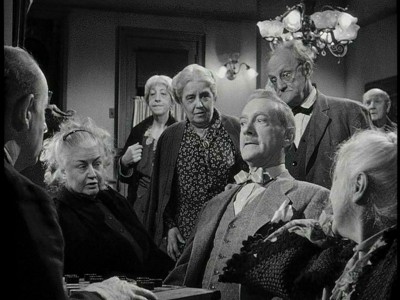
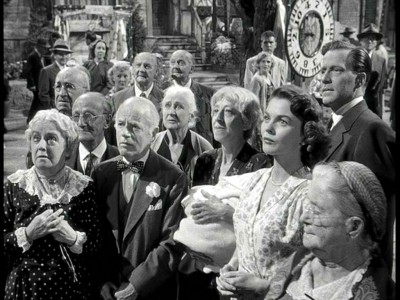
Sitting Pretty, the first Mr. Belvedere movie, was a staple of afternoon syndication when I was a kid, but I'm fairly certain I never saw the second follow-up, Mr. Belvedere Rings the Bell. Too bad, too, because it caught me just right last night when I watched it on this Fox Cinema Archives M.O.D.. Having already noted that the movie was adapted and wrangled into the Belvedere formula (always tricky when an established, outside franchise character is grafted onto a pre-existing work), and reading the brief plot synopsis on the back of the hardcase, I was vaguely skeptical of the enterprise, fearing it would be some sappy exercise in sugary sentimentality, much like that similar, simply awful old folk's home entry in The Twilight Zone: The Movie, from Steven "I Never Met a Plastic Saccharine Moment I Didn't Flog" Spielberg. Far from it. Between Webb's acid tongue (and pure, good intentions), the quietly hilarious tone that director Henry Koster achieves, and the funny yet touching turns by that old pro cast of characters making up the Church of John Home for the Aged, Mr. Belvedere Rings the Bell achieves that rare feat of transcending our genre and stock character expectations...just when we're so sure we already know what we're going to get.
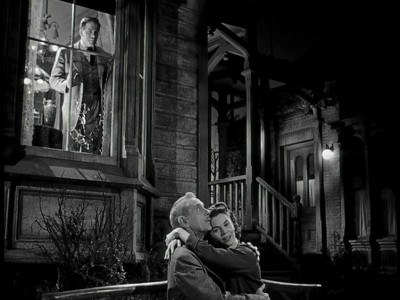
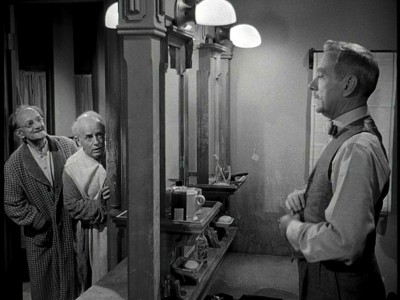
Right from the start, Mr. Belvedere Rings the Bell comes up with little moments of hilarity and gentle emotion that appear out of left field, when we're expecting little more than "amusing." When copper Hugh Beaumont of Leave It To Beaver fame kindly helps crotchety Mrs. Hammer up off the park bench in the movie's opening scene, she plainly states, "Take your filthy hands off me, flatfoot. I hate cops!" (Beaumont laugh, thinking she's reading her detective stories again). So many comedies that feature "funny" elderly characters shoot either for mawkish corniness or grotesque broadness, but here, the oldsters are believably amusing, or sad, or angry―and always completely adorable...but not in that cliched, obvious, cutesy-sickening way. Billy Lynn's (Harvey, The Twonky) Mr. Beebe breaks our heart when he tells Harriet he waits for spring every day, but it never comes...right before he kills us by making a funny mean face when he tosses away her pill (watch Webb's beautifully touching reaction shot when pathetic Mr. Beebe talks happily about his upcoming funeral, all expenses paid by his former employer). Director Koster doesn't yank our tears with these moments; they're simply and honestly presented before he quickly moves on to the next set-up. And when Lynn rejuvenates and starts to feel his oats, Koster is equally adept at standing back and letting him loose (when a dancing Lynn suggests a "triangle" with toothless Harry Hines and pretty Kathleen Comegys, an enthusiastic Hines offers, "If I had my teeth, I'd bite her," to which Lynn delightedly replies, "Sure...go ahead!").
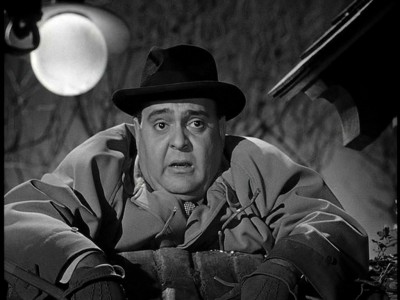
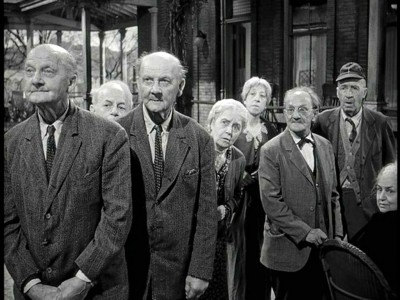
Not all of Mr. Belvedere Rings the Bell is as perfect as happy drunkard Frances Brandt, now sober as a judge, eyeing the Stahmer Twins (Ludwig and Wilhelm Provaznik) with clear eyes and exclaiming, "There really are two of them!" (Brandt is transcendently funny as the rapturously drunk Miss Hoadley). I haven't read or seen The Silver Whistle, but I would imagine the subplot of Webb having Zero Mostel steal stuff for the home has been clumsily grafted over from the play (why would wealthy author Webb need Mostel to steal the stuff...when he buys it in the end, anyway?). The script does cover this bump by making it quite clear Mr. Belvedere enjoys stealing stuff (when Belvedere throws a picnic and is seen carrying some boards out of the woods for a fire, he blithely states, "I found a fence no one was using."). And seriously...who cares about Dru's and Marlowe's weak little love story? Dru does well with her passionate-yet-stifled nurse (she looks suitably ambivalent about old smoothie Webb turning her on), but Marlowe, as usual, is a complete stiff, uninteresting and flaccid in a role that could have come off as intriguingly conflicted (a character intended to be boring can still be interesting...with an interesting actor).
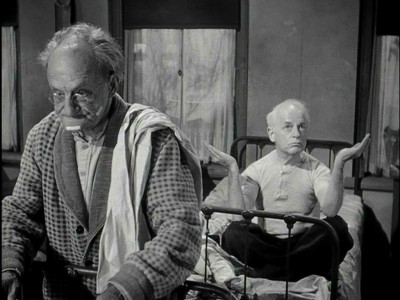
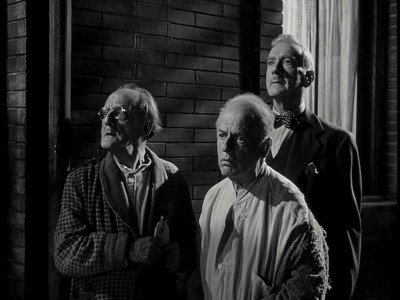
Of course, all of these factors are counterweighted by the remarkable presence of Clifton Webb here, who at a fresh-looking-but-obvious 62-years old, is amusingly cast as a 46-year-old writer pretending to be a 77-year-old retiree who's offended when he's told he looks a youthful 50! I suppose the image one usually conjures up of Webb when he's mentioned is the silky villain of Laura or the arch, vain aristocrat in The Razor's Edge, but I find this particular portrayal, in this third Belvedere outing, one of his most memorable. Proper and correct, but never prim here, Webb hints at an inner world for Belvedere of delicious licentiousness and freedom―"a monument to irresponsible living"―that's immediately appealing when contrasted with his sincere wish to help the people at the home, and his obvious affection for them right from the start. When he chooses to employ his flowery diction, it isn't used to deliberately put us off or by the filmmakers to create self-mockery (as so many stock variations of this effeminate character were utilized in Hollywood films from that period), but rather to intoxicate us with his sharp wit and even sharper honesty (when he helps himself unasked to Marlowe's wine―a rude act we allow him laughingly―he tastes it and asks, "Domestic?" to which Marlowe replies, "I'm afraid so." Webb proceeds to deliberately pour it back in the bottle). With his nose perpetually pointed northward, Webb is a magnificent snot, but wonderfully, he's never offensive: he just happens to be better than most people he meets, and we embrace his rudeness because it's only employed against the stuffy and arrogant who aren't a match for him.
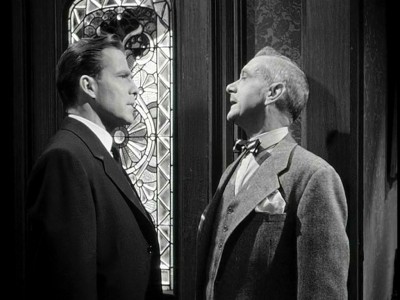
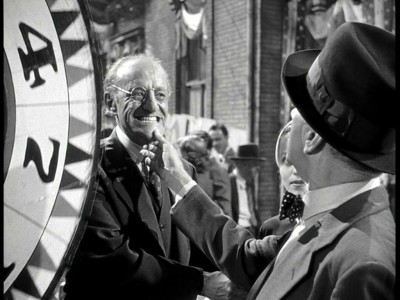
Webb's irrepressibly right Mr. Belvedere is that rare older character whom, by his hyper-proper "otherness," combined with a laser-like American smartassedness (Americans hands-down win the "irreverent wiseass" contest every time) seems hipper than the hippest hipsters. Smirking as he tells arguing "kids" Beebe and Cherry to settle down, Belvedere strings a continuous line of hilarious bullsh*t that you half-believe because it's delivered with such brio and confidence ("In the old days, I even traded slaves...never for money, however―just for laughs.") before he scans an incredulous eye over the next old codger who's said or done something that confounds and amazes him with its complete lack of joie de vivre ("There's much in what you say," he responds dryly to one of Brandt's drunken hiccups). One of the most remarkably funny scenes I've watched in some time―Webb offering Lynn and Hines the chance to "lose a weekend" by downing "youth" pills and whiskey―perfectly encapsulates both the character and the actor. Belvedere offers the sugar pills to first one and then the other eager beaver, who then astound Belvedere with their growing enthusiasm, as he swivels his head, back and forth, regarding them with amusement, and wonder, and obvious but controlled delight as they discover the joys of doing what you're not supposed to do. This goes on for some time (beautifully, beautifully controlled by the actors and director Koster) before they all stop...and Lynn, contemplative for a moment, smiles slyly and simply says: "Let's say dirty words." I haven't laughed that hard or that long for quite some time, nor have I been as impressed with the quiet emotion of Mr. Belvedere's final, dignified departure, when Webb's perfectly controlled performance reveals that Mr. Belvedere gained as much as he gave to the members of the Church of John Home for the Aged.
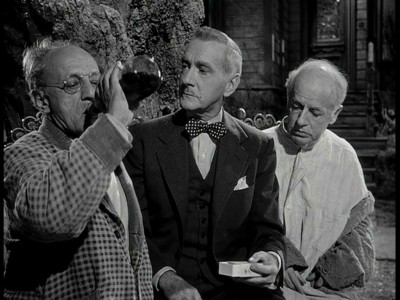
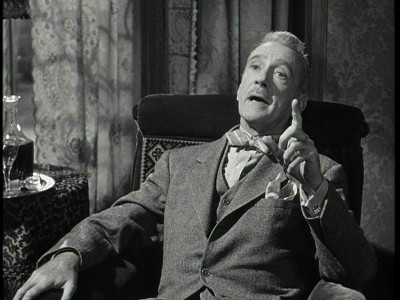
The DVD:
The Video:
The full-screen, 1.33:1 black and white transfer for Mr. Belvedere Rings the Bell looks near-perfect, with a razor-sharp image, solid blacks, minimal grain, and no compression issues.
The Audio:
The English mono audio track is just fine, with little hiss and no distortion. No subtitles or closed-captions available.
The Extras:
No extras for Mr. Belvedere Rings the Bell―not even a trailer. Pity (see below).
Final Thoughts:
So far, the funniest, sweetest movie I've seen this year. Clifton Webb bows out his Mr. Belvedere character with this gently hilarious outing, while old codgers like Billy Lynn and Doro Merande and Frances Brandt (who aren't any older than the spry Webb) almost steal the picture away from him―no small feat. Had Fox Cinema Archives included just one extra―just a trailer, or even a still―it would have justified our highest award here at DVDTalk: the DVD Talk Collector Series. As it is, I highly, highly recommend Mr. Belvedere Rings the Bell.
Paul Mavis is an internationally published movie and television historian, a member of the Online Film Critics Society, and the author of The Espionage Filmography.


|
| Popular Reviews |
| Sponsored Links |
|
|
| Sponsored Links |
|
|
| Release List | Reviews | Shop | Newsletter | Forum | DVD Giveaways | Blu-Ray | Advertise |
|
Copyright 2024 DVDTalk.com All Rights Reserved. Legal Info, Privacy Policy, Terms of Use,
Manage Preferences,
Your Privacy Choices | |||||||









